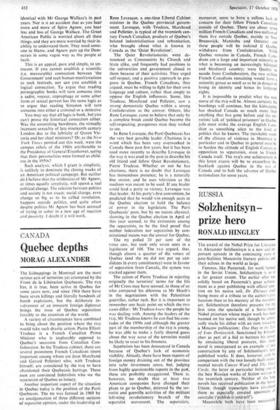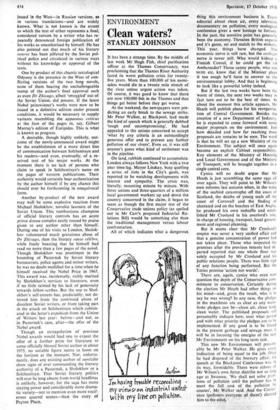RUSSIA
Solzhenitsyn - prize hero
RONALD HINGLEY
The award of the Nobel Prize for Literature to Alexander Solzhenitsyn is a new and im- portant episode in the continuing story of post-Stalinist Muscovite literary politics and their echoes in the world at large.
Famous, like Pasternak, for work banned in the Soviet Union, Solzhenitsyn is so to a far greater extent. The earlier offer was solidly based on Pasternak's great achieve- ment as a poet publishing with official sanc- tion on his native .soil, Dr Zhivago itself being more of a tribute to the author's cilic heroism than to his mastery of the novelist's art. Solzhenitsyn therefore presents for the first time the spectacle of a Soviet-based Nobel prizeman whose major work has been banned on his native soil, though he admit- tedly made his debut with an item issued by a Moscow publication: One Day in the Life of Ivan Denisovich. Sanctioned by K brush- chev as part of a bid to buttress his power by simulating liberal postures, this short novel is unsurpassed as an example of taut construction by any of Solzhenitsyn's later published works. It does, however, pale by comparison with the two loosely-built monu• mental novels Cancer Ward and The Third Circle, the latter in particular being one of the best Russian works of fiction written in the twentieth century. Neither of the long novels has received publication in the Soviet Union, though typescripts have circulated. there as especially coveted specimens of samizdat (`publish-it-yourself'). Meanwhile both have been successfull! issued in the West—in Russian versions, as in various translations—and are widely known. What is not known is the extent to which the text of either represents a final, considered version by a writer who has re- peatedly denounced foreign publication of his works as unauthorised by himself. He has also pointed out that much of his literary oeuvre has been pilfered by the Soviet pol- itical police and circulated in various ways without his knowledge or approval of the texts.
One by-product of this chaotic textological Odyssey is the presence in the West of con- flicting versions of the two long novels, none of them bearing the unchallengeable stamp of the author's final approval such as even Dr Zhivago, albeit 'smuggled' out of the Soviet Union, did possess. If the latest Nobel prizewinner's works were now to be issued in a• definitive edition under present conditions, it would be necessary to supply variants resembling the apparatus criticus at the foot of the pages in, say, Gilbert Murray's edition of Euripides. This is what is known as progress.
A desirable, though highly unlikely, out- come of the newly-announced award might be the establishment of a more direct line of communication between Solzhenitsyn and his readers—and even, eventually, of a re- ceived text of his major works. At the moment there is no lack of persons who claim to speak in Solzhenitsyn's name on the pages of western publications. Their authority would certainly bear authentication by the author himself if by any chance this should ever be forthcoming in unequivocal form.
Another by-product of the new award may well be some explosive reaction from Michael Sholokhov, novelist laureate of the Soviet Union. This rumbustious champion of official literary controls has an acute prima donna complex easily roused by praise given to any author other than himself. During one of his visits to London, Sholok- hov volunteered much gratuitous abuse of Dr Zhivago, then the literary cause Mare, while freely boasting that he himself had read no more than a few pages of the novel. Though Sholokhov was prominent in the hounding of 'Pasternak by Soviet literary bureaucrats, police agents and minor writers, he was no doubt mollified for a time when he himself received the Nobel Prize in 1965. This award was, incidentally, richly merited by Sholokhov's services to literature, even if no little tainted by his lack of generosity towards fellow-scribes. But the sop to Shol- okhov's self-esteem has, predictably, not de- terred him from the continued abuse of dissident Soviet writers, or from taking part in the attack on Solzhenitsyn which culmin- ated in the latter's expulsion from the Union of Writers- last year: before—and not, as in Pasternak's case, after—the offer of the Nobel award.
Though an extrapolation of previous Nobel awards would lead one to expect the offer of a further prize for literature to some officially blessed Soviet author in about 1975, no suitable figure seems to loom on the horizon at the moment. Nor, unfortu- nately, does any existing author of samizdat show signs of ever commanding the literary authority of a Pasternak, a Sholokhov or a Solzhenitsyn. That Soviet literary politics will ever be long absent from world headlines is unlikely, however, for the saga has more staying power and considerably more drama- tic variety—not to mention even more vocif- erous quarrel scenes—than the story of Peyton Place.







































 Previous page
Previous page